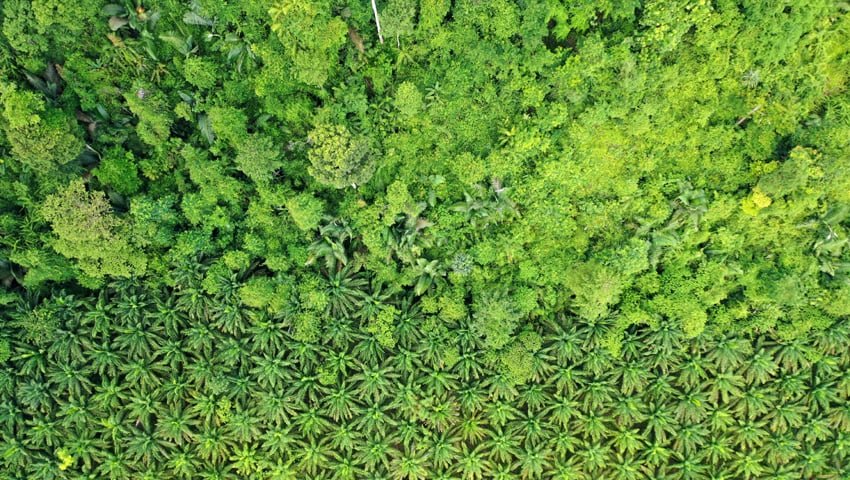The Consumer Goods Forum’s (CGF) Forest Positive Coalition has published its latest report, demonstrating that a growing group of fast moving consumer goods businesses are leading the way in their voluntary commitments to end deforestation, forest degradation and habitat conversion.
Consumer goods businesses have improved transparency in their collaborative efforts to make progress towards eliminating deforestation and ecosystem conversion from global supply chains.
For the first time, 83 per cent of Coalition members have publicly and voluntarily – reported on their Deforestation- and Conversion-Free (DCF) individual commitments. 83 per cent of member companies have disclosed aggregated data as to how much of their palm oil is DCF, 75 per cent for soy, 75 per cent for beef, and 62 per cent for pulp & paper.
The report highlights ongoing challenges, including difficulties with DCF supply and suppliers due to complex supply chains, gaps in public traceability data, and an urgent need to increase the number of companies across supply chains engaging with DCF supply, as limited numbers reduce the sector’s ability to drive broader change.
The report shows the important advancements made by the Coalition as well as highlighting the ongoing challenges and work that remains to be done. Over the past year, 74 per cent of member companies publicly reported their impact on deforestation and conversion of wild landscapes to farmland against a set of proposed key performance indicators such as policies and time-bound action plans, up from 68 per cent a year ago.
This year, 83 per cent of Coalition members reported on their Deforestation- and Conversion-Free (DCF) individual commitments, setting a new baseline for progress. The same number (83%) of members now disclose on an aggregated basis how much of their palm oil is DCF, with 75 per cent reporting for soy, 75 per cent for beef, and 62 per cent for paper, pulp and fibre-based packaging.
The Coalition is an initiative of consumer goods companies collaborating to protect the world’s forests. It is made up of eight multinational retailers – Carrefour, IKEA, Jerónimo Martins, METRO AG, McDonald’s, Sainsbury’s, Tesco and Walmart – and 13 major manufacturers – Asia Pulp and Paper Sinar Mas, Colgate-Palmolive Company, Danone, Essity, General Mills, Grupo Bimbo, Mars Incorporated, Mondelēz International, Neste, Nestlé, PepsiCo, Reckitt and Unilever.
All members are voluntarily committed to collaborative action to remove deforestation, forest degradation and conversion from supply chains.
Wai-Chan Chan, Managing Director of The Consumer Goods Forum, said, “Forests are crucial to providing food, air, water and maintaining life on Earth – yet the world’s forests are in crisis. Greater transparency and collaboration are crucial to drive the pace and scale of change needed, and this report demonstrates the measurable progress our members have made.
“However, it also shows specific challenges that demand sustained attention. Achieving a Forest Positive future depends on a multistakeholder approach and broad, industry-wide engagement. To maintain the momentum we have built, we must continue driving collaborative action, expanding partnerships, and scaling proven initiatives to drive systemic, long-term change.”
The challenges identified by the report include difficulties with DCF supply and suppliers due to complex supply chains, gaps in readily available public traceability data, and an urgent need to increase the number of companies across supply chains engaging with DCF supply, as limited numbers reduce the sector’s ability to drive broader change.
Coalition members are now helping suppliers to produce key commodities in accordance with recommended DCF best practices when it comes to local communities, Indigenous people, workers and the natural world. Through this direct engagement with their own individual supply chains, businesses can pinpoint where risks are likely to occur and create programmes to prevent them.
Forest Positive Coalition Board Co-Sponsors, Alexandre Bompard, CEO, Carrefour and Noel Wallace, Chairman, President and CEO, Colgate-Palmolive, said, “We are determined to build on the momentum we have created and move forward with greater ambition and transformative action. To increase the impact of our initiatives, we call on the wider industry to step up and engage with us in driving systemic change. Join us in supporting DCF supply chains and Forest Positive landscapes by collaborating on these goals and supporting our landscape initiatives.”
The report also outlines the Coalition’s increased engagement with local stakeholders in deforestation hotspots, including its partnerships on projects with over 250 stakeholders, such as governments, Indigenous communities, NGOs and business leaders. In addition, it details members’ investment in 26 landscape initiatives designed to restore ecosystems and create sustainable livelihoods.
Together, the Coalition members account for an overall market value of USD $1.8 trillion and 3 per cent of global consumption of four forest-risk commodities; palm oil, soy, beef, and paper, pulp and fibre-based packaging. Their measurable progress towards eliminating deforestation and ecosystem conversion from global supply chains, through increased transparency and collaboration, provides a roadmap for the wider FMCG sector to act to end deforestation.
